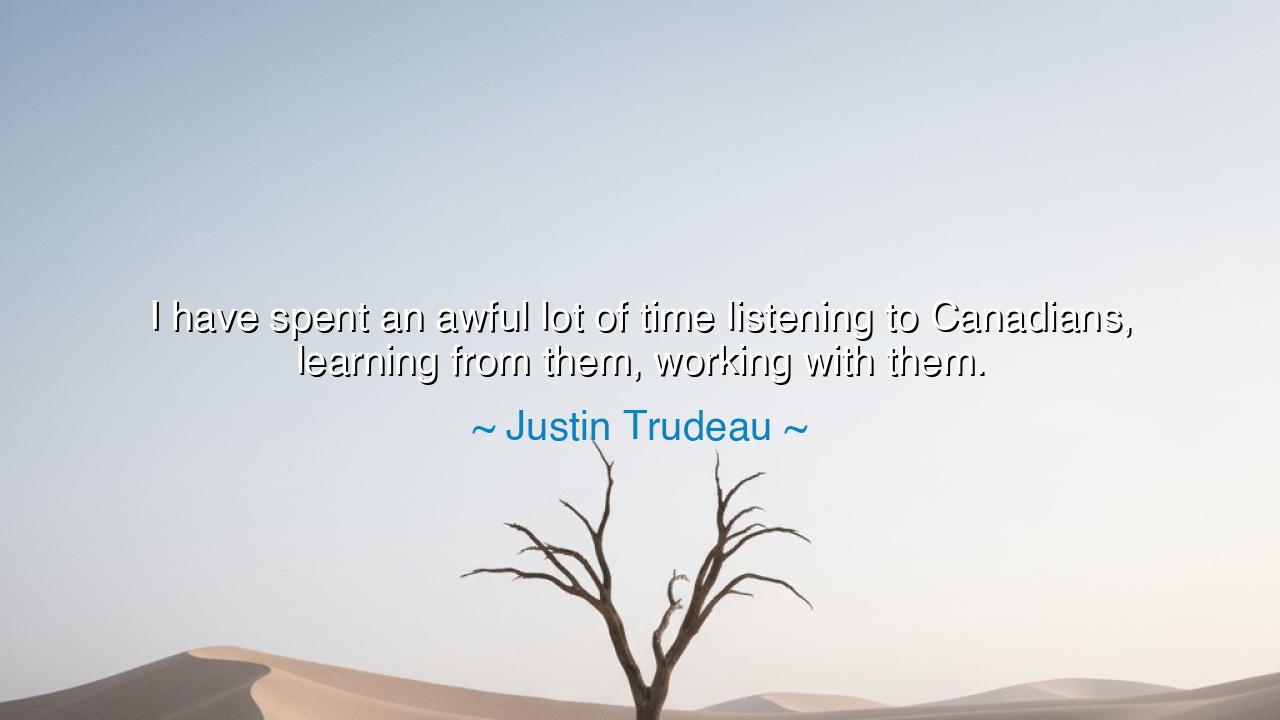
I have spent an awful lot of time listening to Canadians
I have spent an awful lot of time listening to Canadians, learning from them, working with them.






When Justin Trudeau said, “I have spent an awful lot of time listening to Canadians, learning from them, working with them,” he was not merely describing a habit of leadership; he was revealing a philosophy of governance and humanity itself. His words speak of the ancient art of listening—that quiet, humble power through which understanding is born and unity is forged. For in every age, those who would lead must first become servants of the people’s voice. Trudeau’s statement, simple in form yet deep in meaning, reminds us that leadership begins in the ear before it speaks through the tongue. He sees the act of listening not as a gesture of politeness, but as a sacred duty—the way a shepherd learns the song of his flock, or how a teacher learns from the curiosity of his students.
In the tradition of the ancients, to “listen” was to honor the soul of another. Great rulers and wise philosophers knew that to understand one’s people was to walk among them, to hear their laughter and their pain. The Chinese sage Confucius once said, “When you know what people desire, you can guide them.” So too does Trudeau’s sentiment reflect this timeless truth: that learning from the people is not a sign of weakness, but of wisdom. For no one man, however learned, can know the hearts of millions without first bowing before their lived experience. True authority, the ancients taught, does not descend from the throne—it rises from the ground, carried upward by the trust of those who are heard.
Trudeau’s words also carry the spirit of his homeland—Canada, a vast and diverse nation woven together from many voices, histories, and lands. To lead such a country requires not the force of command, but the strength of empathy. It is a land where the wisdom of Indigenous elders meets the dreams of immigrants, and where listening becomes the bridge between past and future. Trudeau’s acknowledgment that he has “learned from them” shows that he understands this truth: that a nation’s wisdom does not reside in its government, but in its people. The teacher must sometimes learn from the student, the leader from the laborer, and the ruler from the ruled.
Throughout history, those who have forgotten to listen have seen their kingdoms crumble. Consider the story of King Rehoboam, son of Solomon, who ignored the counsel of his elders and the cries of his people. When they pleaded for mercy from heavy burdens, he replied with arrogance, saying he would make their yoke heavier still. And the kingdom split asunder, never to be whole again. His failure was not in might or intellect, but in the refusal to listen. In contrast, those who listened—like Abraham Lincoln, who walked among soldiers and citizens alike, learning their sorrows—rose above division and led with compassion. Trudeau’s quote echoes this timeless pattern: that listening is not passive—it is the foundation of harmony and endurance.
But listening alone is not enough. Trudeau couples it with action—with “learning” and “working.” To listen is to open one’s heart; to learn is to open one’s mind; but to work alongside the people is to open one’s hands. The union of these three virtues—humility, understanding, and service—forms the triad of true leadership. This trinity can be seen throughout human history, from the generals who fought beside their soldiers to the reformers who lived among the poor. The leader who both hears and labors with his people becomes more than a ruler—he becomes their reflection.
There is, too, a deeper human lesson here beyond politics. For each of us, whether leader or follower, must learn to listen if we wish to live wisely. In our modern world, voices shout but few truly hear. Yet listening remains the root of all connection and peace—between friends, between families, between nations. To listen well is to give dignity to another soul; to learn from others is to free oneself from pride; to work together is to turn understanding into creation. This, perhaps, is what Trudeau’s words call us to remember: that the most powerful act is not to speak, but to listen with the intent to grow.
So let this teaching be passed down: he who listens leads, and he who learns loves. Whether one governs a nation or guides a single heart, let him walk among the people, hear their stories, and learn their truth. For wisdom does not dwell in isolation—it breathes in the shared air of conversation and compassion. Trudeau’s words remind us that the strength of a leader lies not in how loudly he commands, but in how deeply he listens. And so, may all who seek to lead—whether in home, in work, or in the world—remember this: the voice that listens with humility shall always hear the path of wisdom.






AAdministratorAdministrator
Welcome, honored guests. Please leave a comment, we will respond soon